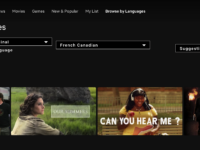The Toronto International Film Festival has removed from its 2025 schedule a documentary film by Canadian filmmaker Barry Avrich that tells the story of Noam Tibon’s mission to save his family during the October 7th attacks by Hamas in Israel. The film is based on the excellent book by Amir Tibon, the Gates of Gaza, which recounts both the rescue effort and the longstanding fraught relationship between Israel and Gaza. According to Deadline, the film, titled The Road Between Us: The Ultimate Rescue, was scheduled to be included in the program announced last week. But TIFF asked that the source of Hamas body-cam footage included in the film be identified and to provide copyright clearances for the video. You read that correctly: TIFF wanted the filmmakers to obtain copyright licences from Hamas terrorists.

Fair Dealing by Giulia Forsythe (CC BY-NC-SA 2.0) https://flic.kr/p/dRkXwP
Copyright
Canada’s DST Debacle a Case Study of Digital Strategy Trouble
My Globe and Mail op-ed opens by noting that after years of dismissing the warnings of likely retaliation, the Canadian government caved to U.S. pressure earlier this week as it cancelled the digital services tax. Faced with the U.S. suspension of trade negotiations, Finance Minister François-Philippe Champagne announced that the government would rescind the legislation that created it.
Quebec’s Streaming Regulation Bill 109: Unconstitutional, Unnecessary, and Unworkable
The federal government’s plans to regulate internet streaming services such as Netflix and Spotify through the Online Streaming Act have been mired in regulatory battles and court cases for many months. My Globe and Mail op-ed notes that the government’s plans finally took a small step forward last month, as Canada’s broadcast regulator, the Canadian Radio-television and Telecommunications Commission, completed weeks of hearings into what counts as Canadian content, or “Cancon.”
Yet in the midst of the latest hearings, the Quebec government threw a monkey wrench into the entire process. Not content to wait for the CRTC process to play out, the provincial government introduced its own streaming regulation bill that is likely to spark a constitutional challenge. Quebec’s Bill 109 contemplates government intervention into how content is presented to subscribers, and would introduce unprecedented quota requirements that could lead to blocked services in Quebec or the removal of thousands of non-French titles from content libraries.
The Law Bytes Podcast, Episode 234: “Solutions Aren’t Going to be Found Through Nostalgia”: Mark Musselman on the CRTC Hearings on Canadian Content Rules
The CRTC recently wrapped up a two-week hearing on the Online Streaming Act that featured most of the usual suspects, though notably not the large streaming services. The Commission grappled with foundational issues such as modernizing the definition of Canadian content, instituting IP requirements, and introducing new discoverability rules into Canada’s broadcasting regulatory framework.
Mark Musselman is a former entertainment lawyer, longtime Canadian movie producer, current PhD student focused on cultural and legal policy, and the author of the White Paper Black Coffee substack. Having appeared many times before the CRTC, he joins the Law Bytes podcast to discuss the recent Cancon hearing, breaking down the major issues of debate and identifying what was missing from the discussion.
Why Years of Canadian Digital Policy Is Either Dead (Prorogation) or Likely to Die (Trump)
The Canadian political and business communities are unsurprisingly focused on the prospect of U.S. President Donald Trump instituting 25% tariffs on Canadian goods and services. The threat of tariffs, which could spark a retaliatory response by Canada and fuel a damaging trade war, would likely cause serious harm to the Canadian economy. But tariffs aren’t the only story arising from new Trump actions in his first day in office. Amidst the many executive orders signed on day one are several with significant implications for Canadian law, particularly Canadian digital policies such as the digital services tax, mandated streaming payments arising from Bill C-11, and mandated payments for news links due to Bill C-18. When combined the government’s decision to prorogue Parliament earlier this month, the results of years of Canadian digital laws and policies now largely fall into two groups: those that have died due to prorogation and those that are likely to die due to Donald Trump.











